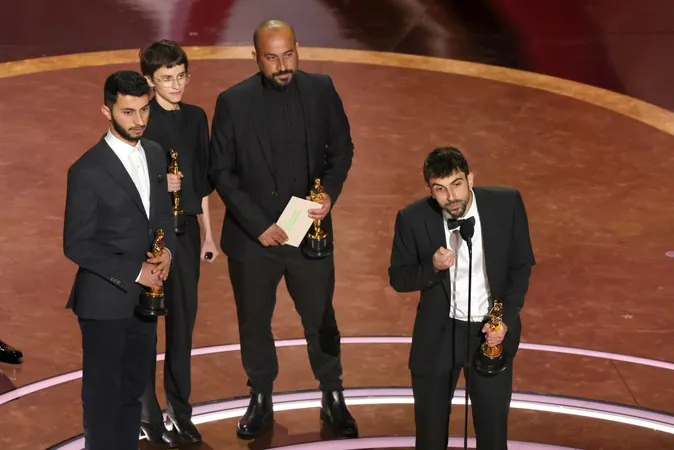
Academy Governors in Crisis Mode as Filmmakers Demand Action Following Beating of Oscar-Winning Director
2025-03-28
Author: Wai
Academy Governors in Crisis Mode as Filmmakers Demand Action Following Beating of Oscar-Winning Director
In an urgent assembly convened this morning, the Academy’s board of governors deliberated on a rapidly escalating crisis surrounding the assault and subsequent detention of Hamdan Ballal, a notable Oscar-winning Palestinian filmmaker and one of the directors behind the acclaimed documentary *No Other Land*. The gathering took place at 11 am Pacific Time as calls for a more robust response have surged from within the Academy.
A powerful coalition of over 600 Academy members, including A-list actors like Olivia Colman, Joaquin Phoenix, Javier Bardem, and directors Ava DuVernay and Adam McKay, has signed a letter criticizing Academy President Janet Yang and CEO Bill Kramer for their delayed and inadequate response to the incident. This strong statement called for more decisive action in light of Ballal's treatment at the hands of Israeli authorities, which reportedly included his assault and mocking by police following an attack by settlers outside his home in the West Bank.
The timely reaction from Academy members came following a non-specific and tepid letter issued by Yang and Kramer, which failed to name Ballal or acknowledge the film directly. Their original statement, sent privately to members, only appeared after an Israeli co-director of *No Other Land*, Yuval Abraham, publicly reprimanded the Academy for its silence.
The newly released letter expresses unity and condemnation for the 'brutal assault and unlawful detention' of Ballal, emphasizing the critical role of filmmakers in challenging narratives and shining a light on severe global injustices. The signatories contend that it is unacceptable for the Academy to celebrate a film, only to then neglect its makers when they face violence and oppression.
'*No Other Land*,' which presents a gripping portrayal of life in Palestine under military occupation, has received particular admiration following its Academy Award win. With powerful imagery depicting the demolishment of homes and unprovoked settler violence, the filmmakers indeed took a considerable risk in portraying these difficult truths. The Academy’s inaction now places a spotlight on the vulnerability of artists who tell uncomfortable stories.
Commentators within the Academy expressed shock at the leadership’s handling of the incident, labeling it 'embarrassing and shameful.' They expressed their discomfort that the initial statement lacked not only specificity but also the passionate support that artists expect in prioritizing their safety and rights.
In the wake of the incident, several prominent organizations, including the European Film Academy and the International Documentary Association, have voiced their concerns, aligning with the Academy members' calls for accountability.
As a reminder of the stakes involved, the Academy has been criticized in the past for its public stance on matters affecting filmmakers. The last significant public statement regarding such incidents was made in 2011 when it demanded the release of detained Iranian filmmakers, showcasing a history of advocacy that seems to have waned.
With threats to filmmakers’ safety on the rise, those advocating for Ballal's protection are determined to maintain pressure on the Academy to ensure that their voices — as artists — are heard and defended against censorship and violence globally.
This evolving situation continues to draw attention, highlighting the delicate balance between artistic expression and political oppression in an increasingly contentious climate. As further developments unfold, the film community remains vigilant, calling for justice for Ballal and solidarity with all filmmakers facing persecution.



 Brasil (PT)
Brasil (PT)
 Canada (EN)
Canada (EN)
 Chile (ES)
Chile (ES)
 Česko (CS)
Česko (CS)
 대한민국 (KO)
대한민국 (KO)
 España (ES)
España (ES)
 France (FR)
France (FR)
 Hong Kong (EN)
Hong Kong (EN)
 Italia (IT)
Italia (IT)
 日本 (JA)
日本 (JA)
 Magyarország (HU)
Magyarország (HU)
 Norge (NO)
Norge (NO)
 Polska (PL)
Polska (PL)
 Schweiz (DE)
Schweiz (DE)
 Singapore (EN)
Singapore (EN)
 Sverige (SV)
Sverige (SV)
 Suomi (FI)
Suomi (FI)
 Türkiye (TR)
Türkiye (TR)
 الإمارات العربية المتحدة (AR)
الإمارات العربية المتحدة (AR)